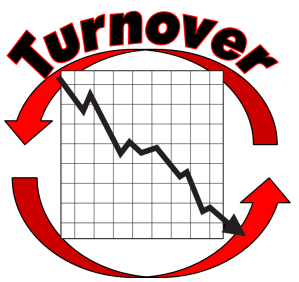Tagged: sales compensation
Salesperson Turnover: Is Your Manager Hiring The Wrong People Or Did You Hire The Wrong Manager?
 Unwanted turnover on a sales team can be a fatal blow to achieving revenue goals. Unfortunately, many sales managers still have the mindset that turnover or “churn” is to be expected, especially in rookie sales positions. I couldn’t disagree more. Not only shouldn’t it be expected, it shouldn’t be tolerated either. If you are a sales manager with a high turnover ratio (or the manager of someone who does) you need to find out the reasons and quickly. Not only does this churn cost you thousands of dollars in recruitment and training costs, and untold thousands of dollars in lost opportunities costs, but it also is damaging to morale and makes your company look bad in the eyes of your customers.
Unwanted turnover on a sales team can be a fatal blow to achieving revenue goals. Unfortunately, many sales managers still have the mindset that turnover or “churn” is to be expected, especially in rookie sales positions. I couldn’t disagree more. Not only shouldn’t it be expected, it shouldn’t be tolerated either. If you are a sales manager with a high turnover ratio (or the manager of someone who does) you need to find out the reasons and quickly. Not only does this churn cost you thousands of dollars in recruitment and training costs, and untold thousands of dollars in lost opportunities costs, but it also is damaging to morale and makes your company look bad in the eyes of your customers.
So, back to the original question, is the sales manager hiring the wrong people or is the sales manager the problem (or both)? To find out the answers, here are the questions you need to ask…
h
1. IS THERE ANYTHING HAPPENING IN THE MARKET THAT COULD LEGITIMATELY BE THE CAUSE OF AN INCREASE IN TURNOVER? Is your turnover significantly higher than your competitors? Have there been any major changes in the market or your industry?
p
 2. ARE YOU DOING EXIT INTERVIEWS? YOU MUST! An exit interview should be done by an HR representative for every salesperson who leaves, whether the person is fired or leaves voluntarily. Or, you can use an online service to do this. (Questionpro.com is one that is free and has exit interview templates you can customize.) You need this information to help diagnose and get to the root of the problem.
2. ARE YOU DOING EXIT INTERVIEWS? YOU MUST! An exit interview should be done by an HR representative for every salesperson who leaves, whether the person is fired or leaves voluntarily. Or, you can use an online service to do this. (Questionpro.com is one that is free and has exit interview templates you can customize.) You need this information to help diagnose and get to the root of the problem.
p
3. ARE YOU DOING 360 SURVEYS WITH EXISTING SALESPEOPLE? This is an important tool in revealing many potential problems before it’s too late. Again this can be done online and anonymous with free tools such as freeonlinesurveys.com. The following questions are ones that will help you determine whether you have a hiring problem or a management problem, and where the issue(s) may be:
- Did you receive the initial training and onboarding needed to be successful in the position?

- Do you feel you are getting the on-going managerial coaching and training you need?
- Do you have the tools and resources to be successful in your sales role?
- Are you recognized for excellent performance?
- Is poor performance addressed and confronted quickly?
- Do you feel you have a career path with the company?
- Do you feel you are continuing to develop your professional skills and knowledge?
- Was your compensation package presented to you accurately?
- Has the company and your manager lived up to what you expected when hired?
- Are you proud of what you sell and do you feel the company has a solid reputation in the business community?
- Do you believe your manager is invested in your success and can help you achieve your goals?
- Does your sales manager meet with you on a regular basis and communicate information you need to know?
p
4. ARE YOU PAYING YOUR SALESPEOPLE APPROPRIATELY? You need to analyze your comp plan and consider the following questions:
- What is the likely amount a salesperson will make the first year under this plan?
- Is this competitive with what the salesperson could make with an industry competitor? What about a sales position with another industry?
- Are you asking the salesperson to take all the risk?
- Is the comp plan designed to launch the person successfully or is it full of potential roadblocks?
- Is the comp plan straightforward and easy to understand?
p
5. ARE YOU SETTING AND MANAGING EXPECTATIONS IN THE INTERVIEW PROCESS? Starting a new job is fraught with stress coming from all areas of a person’s life. The last thing you want is for that new salesperson to feel he was misled (whether intentional or not) about the position. The sales manager must make sure she is 100% transparent about the pros and cons of the job, what the salesperson should expect in the first 30 days, 6 months, one year, and very clear about what expectations the manager has of performance. This should be continually reiterated in each interview and spelled out in writing in the offer letter.
p
6. ARE YOU FOLLOWING A SET HIRING PROCESS DESIGNED TO FIT TALENTS TO TASK? This means having a set hiring process in place which is specifically designed to identify a person’s talents and skills; then determining if those are a fit for your sales position. The following is the process I use and have found to be effective:
- Define the sales position. What exactly will the salesperson be asked to do? What are the requirements of the job?
- Based on the above information, what talents, skills, and experience does the salesperson need to have on day 1? What are the skills you are willing to train for? This doesn’t mean describe your “IDEAL” candidate. This means list the “deal breakers” those competencies the person MUST have to be considered and those that you would “like” but don’t have to have.
- Based on those requirements, vet every application you receive against those and only proceed with candidates who meet those requirements.
- Do preliminary phone interviews FIRST with those candidates whose applications/resumes you have vetted. The phone interview should be 20-30 minutes and you should use a prepared list of behavioral based interview questions. (see related article “My 25 Favorite Salesperson Interview Questions”) Every person you phone screen should be asked the same questions so that you can fairly assess the answers and stay in EEOC compliance.
- Do face-to-face interviews with those candidates who have “passed” your screening interview. These in-person interviews should also be comprised of a set list of behavioral based questions that are the same for each candidate.
- Do reference checking and background checks at this stage. Don’t wait until you’ve decided on one candidate only to find out the person has something in his or her background or former job that knocks him out of the running. Use an online reference checking system like www.Checkster.com. (see related article “5 Steps For Getting real Information From Candidates’ References”)
- The candidates should interview with a minimum of two people in the company. Ideally interviews should include the sales manager, the sales manager’s manager, an existing sales person, and an H.R. or manager from a different department that interacts with sales. The interviewer should take specific notes on the candidates’ answers. Then all interviewers should give their evaluation of the candidate to the sales manager or fill out a candidate evaluation form.
- Use a validated, PREDICTIVE, sales assessment for final candidates. Sales assessments are key to increasing your successful hires. Only 14% of sales people hired based on only interview information are successful hires. A good sales assessment should boost that number to about 80%.
- Evaluate ALL the information you have on a candidate before offering the position. This includes interview information, reference checking information, sales assessment results, and of course your “gut instinct.” This is referred to as the 30%-30%-30%-10% rule.
p
7. DO YOU HAVE AN ONBOARDING PROGRAM IN PLACE? Even if you’ve done everything right in the hiring process up to this point, if you don’t have a well-designed onboarding program you are setting your new hire up for failure. Research shows that salespeople get up to speed 51% faster when a company has an onboarding program. Onboarding includes not just outlining first day or the first week, but the first 30 days and beyond (see related article “Steps For Keeping Your New Sales Hire From Circling The Drain” for onboarding tips).
p
8. DO YOU HAVE AN INDIVIDUALIZED COACHING PLAN FOR EACH SALESPERSON? It is the sales manager’s responsibility to develop a salesperson’s talents and skills through coaching (see related article “Tips For Coaching Your Salesperson”). To effectively coach you must first know what those specific talents and skills are (the sales assessment should tell you  that) and then have a plan in place for how you will best manage and develop them. A coaching plan should include at a minimum the following information.
that) and then have a plan in place for how you will best manage and develop them. A coaching plan should include at a minimum the following information.
- Goals we have agreed upon and date to be achieved
- The salesperson’s expectations of me the sales manager
- My expectations of the salesperson
- Top 3 motivators
- I should remember NOT to do
- Likes recognition in the form of
- What salesperson likes best about sales
- What salesperson like least about sales
- Long range career goals
- Key strengths/weaknesses
- Growth area salesperson would like to develop and how I will assist
All of this information should be discussed in the first days after the new hire begins the job and should be updated every 6 months.
p
Infographic: What Mis-hired Misfires Cost You
Why Your Salespeople Quit
A recent article I read quoted some shocking research findings…94% of employees who leave a company do so because they were dissatisfied or had a desire to leave NOT because of the attraction or availability of an outside job opportunity. (See Infographic and link to article below)
But what about salespeople specifically – why do they leave? Is it for the same reasons or different ones? Over the years as I’ve interviewed and coached salespeople, I noticed that their answers to why they left a job are usually for one of the reasons listed below. You’ll notice that most of them start with, “My Manager…” That isn’t a coincidence. Even the reasons that aren’t directly sales manager related are still issues that a sales manager has influence over, or at least could acknowledge and look for ways to improve or work around them. As Marcus Buckingham said, “People don’t leave jobs, they leave managers.”
My Manager Was A Bully – Descriptions of this sales manager usually revolve around the sales manager who constantly threatens or tries to intimidate salespeople into performing. You know, the “Coffee is for closers!” type.
 My Manager Was A Control Freak – One of the top reasons salespeople are drawn to sales in the first place is the opportunity to work independently and feel they have control over their business. They are entrepreneurial and look at sales as running their own small business operation. If they feel their manager is watching every move they make, it feels insulting and implies you don’t trust them. Holding people accountable? Absolutely. But that does not mean micro-managing. Micro-management just does not work with top performing salespeople.
My Manager Was A Control Freak – One of the top reasons salespeople are drawn to sales in the first place is the opportunity to work independently and feel they have control over their business. They are entrepreneurial and look at sales as running their own small business operation. If they feel their manager is watching every move they make, it feels insulting and implies you don’t trust them. Holding people accountable? Absolutely. But that does not mean micro-managing. Micro-management just does not work with top performing salespeople.

My Manager Was Worthless – Ouch! The examples I usually hear on this one are about management ineptness or inability to help a salesperson get things accomplished. Top salespeople look to their manager to help them cut through the company bureaucracy, be their supporter and cheerleader, be a sounding board, and offer advice or ideas when needed. If salespeople don’t see their manager as a resource and someone who can help them meet their goals, you’re dead to them. (Click HERE for “Tips For Coaching Your Salespeople”)
My Manager Was Constantly Changing My Goals/Compensation – Sales managers that continually change commission structures, budgets, or goals, quickly gain the ire of their salespeople. Not only does it make you look indecisive, it makes the salesperson feel powerless. And it’s just as de-motivating to constantly be changing a salesperson’s focus and priorities. Managers who have a new “flavor-of-the-week” priority they want a salesperson to concentrate on selling, frustrate their salespeople and diminish their effectiveness.
 My Manager Didn’t Appreciate Me – Sound egotistical? Maybe, but a strong ego drive is crucial to successful selling so why are so many sales managers surprised that their salespeople need ego stroking? Recognition and praise are critical components to managing people successfully but I think this is particularly important with salespeople who deal with far more rejection than successes. They need to know their manager understands what they face each day, and appreciates it. Sure praising a great sale is good – but that is expected. Praise and recognition for other aspects of the job like creating a great presentation, helping the client achieve an objective, developing strong client relationships, even getting paperwork in on time – now that, a salesperson will remember. Keeping a salesperson engaged and motivated is paramount and is a direct indicator of how long that person will be with you, and more important – how effective! (Click HERE for “Keeping Employees Engaged”)
My Manager Didn’t Appreciate Me – Sound egotistical? Maybe, but a strong ego drive is crucial to successful selling so why are so many sales managers surprised that their salespeople need ego stroking? Recognition and praise are critical components to managing people successfully but I think this is particularly important with salespeople who deal with far more rejection than successes. They need to know their manager understands what they face each day, and appreciates it. Sure praising a great sale is good – but that is expected. Praise and recognition for other aspects of the job like creating a great presentation, helping the client achieve an objective, developing strong client relationships, even getting paperwork in on time – now that, a salesperson will remember. Keeping a salesperson engaged and motivated is paramount and is a direct indicator of how long that person will be with you, and more important – how effective! (Click HERE for “Keeping Employees Engaged”)
 My Manager Played Favorites – Sure this might sound a little like “teacher’s pet” finger pointing, but perception is reality. Salespeople do tend to be hyper-alert to whether or not they are on a level playing field with their fellow sellers. I think this is because salespeople are usually quite competitive by nature. And, wouldn’t you be frustrated if you thought the person(s) you are competing against had an unfair advantage over you?
My Manager Played Favorites – Sure this might sound a little like “teacher’s pet” finger pointing, but perception is reality. Salespeople do tend to be hyper-alert to whether or not they are on a level playing field with their fellow sellers. I think this is because salespeople are usually quite competitive by nature. And, wouldn’t you be frustrated if you thought the person(s) you are competing against had an unfair advantage over you?
My Manager Only Cared About Himself/Herself – Often I hear stories from salespeople about how their sales manager wasn’t invested in making the salesperson a success, it was all about the sales manager looking good. Examples of this include the sales  manager who is a “credit hog” and takes the credit for a salesperson’s success; the egotistical sales manager who is all about being “the boss” – you know the type, they refer to the sales team as “MY sales team”; and the sales manager who positions everything to upper management in a way that makes him or her look like the hero. When coaching new sales managers I tell them if you shine the spotlight on yourself you’ll soon be playing to an empty house, shine the spotlight on the achievements of your salespeople and they will make you a star.
manager who is a “credit hog” and takes the credit for a salesperson’s success; the egotistical sales manager who is all about being “the boss” – you know the type, they refer to the sales team as “MY sales team”; and the sales manager who positions everything to upper management in a way that makes him or her look like the hero. When coaching new sales managers I tell them if you shine the spotlight on yourself you’ll soon be playing to an empty house, shine the spotlight on the achievements of your salespeople and they will make you a star.
 My Manager Was A Liar – This one is simple to avoid. Don’t make promises unless you are 100% sure you can keep them. And if you make a promise, back it up 100%. Salespeople are expert at nailing people down and getting an answer. It’s called closing! As a sales manager, you are spinning a lot of plates and it is easy to give a quick “yes” to get something resolved quickly. But that can come back to haunt you and cause problems later if you can’t deliver. It’s better to say, “I’m not sure” and set a time to revisit the issue than to be seen by your salespeople as someone who doesn’t live up to his commitments.
My Manager Was A Liar – This one is simple to avoid. Don’t make promises unless you are 100% sure you can keep them. And if you make a promise, back it up 100%. Salespeople are expert at nailing people down and getting an answer. It’s called closing! As a sales manager, you are spinning a lot of plates and it is easy to give a quick “yes” to get something resolved quickly. But that can come back to haunt you and cause problems later if you can’t deliver. It’s better to say, “I’m not sure” and set a time to revisit the issue than to be seen by your salespeople as someone who doesn’t live up to his commitments.
No Growth Opportunities – Salespeople are entrepreneurial, and a characteristic of being entrepreneurial is wanting to continue to grow, learn, and do new things. When salespeople leave because they say there were no growth opportunities it doesn’t just mean management jobs. Take the time to find out what each of your salespeople are interested in learning and doing. Many times, it ISN’T a management position. It may be additional training, learning a new product to sell, mentoring rookies, collaborating or learning about other parts of the company, etc.
 Compensation – When a salesperson leaves because of money (although numerous research studies have shown that this is RARELY the top reason a salesperson quits) it is usually because he or she feels they are being stifled or “capped” on their income potential. Most salespeople are motivated by the concept of “the harder I work, the more I sell, the more money I make.” If that is taken away (whether it is perception or in reality) it can severely de-motivate the salesperson.
Compensation – When a salesperson leaves because of money (although numerous research studies have shown that this is RARELY the top reason a salesperson quits) it is usually because he or she feels they are being stifled or “capped” on their income potential. Most salespeople are motivated by the concept of “the harder I work, the more I sell, the more money I make.” If that is taken away (whether it is perception or in reality) it can severely de-motivate the salesperson.
The Sales Team Sucked – No, no one has actually said it to me quite that way. But, top performing salespeople will leave if they feel  they are working with sub-par sellers. Quite simply, talented people want to work with talented people. If a salesperson feels that they are surrounded by other salespeople who are not as motivated to achieve, the salesperson starts to wonder, “Why am I here?” Top salespeople are energized by other successful salespeople because they like to measure their success against what their co-workers have achieved. It doesn’t feel like a win if you are Michael Jordan and you slam dunk on a high school kid.
they are working with sub-par sellers. Quite simply, talented people want to work with talented people. If a salesperson feels that they are surrounded by other salespeople who are not as motivated to achieve, the salesperson starts to wonder, “Why am I here?” Top salespeople are energized by other successful salespeople because they like to measure their success against what their co-workers have achieved. It doesn’t feel like a win if you are Michael Jordan and you slam dunk on a high school kid.
 Lack of Tools, Training, or Leadership – It is important to salespeople that they work in a culture where they feel the company is investing in them. This means having the tools and support they need to be effective salespeople. And, that includes having an Onboarding Program to get a salesperson started off on the right path – and the right training tailored to each individual. (Click HERE for “How To Keep Your New Salesperson From Circling The Drain”)
Lack of Tools, Training, or Leadership – It is important to salespeople that they work in a culture where they feel the company is investing in them. This means having the tools and support they need to be effective salespeople. And, that includes having an Onboarding Program to get a salesperson started off on the right path – and the right training tailored to each individual. (Click HERE for “How To Keep Your New Salesperson From Circling The Drain”)
It also means having a management team that is able to articulate and implement a vision for where they are headed. Having strong management leadership is a critical component to long-term sales team stability. If the company is in continual chaos, sales turnover is always the end result.
“Training and development (of employees) must be built into a company on all levels – training and development that never stops.” -Peter Drucker
Infographic courtesy of Paycom. (click here to read full article)



